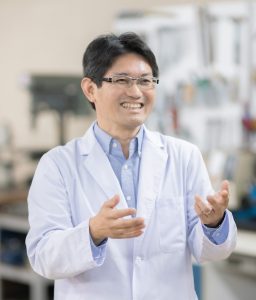Welcome to ME Department!

Yuji Nakamura, Prof. Dr.: ME Department Chair since 2024 concurrently acting as Manager / Executive Leader of Energy Conversion Engineering Laboratory
Mechanical engineering (ME) is classical yet an indispensable academic field for variety of industrial applications (e.g., automotive and heavy industry, material and chemistry, electrical and power device, robot and mechatronics, transport equipment). Probably you may understand that the industrial fields of food and chemistry are quite far from ME and rarely related; but the answer is “No”. Even these “looks-far-from-ME” industries need numerous mechanical facilities to produce their products. Then, rich learning of mechanical engineering is sufficient to fulfil such demands? This answer is also “No” since the rich knowledges are no use from engineering point of view unless engineers trained enough to know how to use/apply to resolve the actual problems. Our ME program offers lectures to gain fundamental knowledges and “rich” chances to train how to use/apply in variety of engineering fields. Indeed, our alumni (your future colleagues) had engaged on variety of engineering fields to play their role to help further development and future innovation.
ME covers wide area of engineering based on four major (classical) essential bones; such as dynamics of machinery, thermodynamics, fluid mechanics, and solid mechanics. In addition to such basic framework, to meet the actual demands from various kinds of engineering field, other basic fields must be covered as well, such as material science, robotics dynamics, machine control etc. For instance, we you may notice, variety of materials in frame have been adopted to the products, such as polymer, ceramic and metals, so that knowledges of material science are required for mechanical engineers. Automation of industrial factories must be supported by rich fundamentals of robotics and control and wide range of knowledges on actual devices like actuator and also global system design to select the best scheduling in order to operate in optimum condition is very useful. As you may notice, simple wording “Mono-zukuri (product generation)” is not really simple, rather, amazingly complex combining rich knowledges of vast fields with deep concerns on how to apply to reach the best solution.
In order to cover all abovementioned demands, the Department of Mechanical Engineering at Toyohashi University of Technology (ME-TUT) renovated in 2010 (H22) to train our students to fit to the needs from wide-range area of engineering fields through high-level education on technology and science for mechanical engineering. In detail, based on fundamental aspects of conventional ME (e.g., mechanical design, energy, production/manufacturing, system integration), we offer the education on innovative material science and engineering, nano-technology, bio(medical)-engineering, environmental engineering, management technology to support and enhance the MONO-ZUKURI (Japanese-traditional high-quality production legacy). To end, our ME department consists four courses “Mechanical System Design”, “Material and Manufacturing”, “System Control and Robotics”, and “Environmental and Energy”, and laboratories in our department are all affiliated with those four courses and professional academic staffs deliver professional education through their expertise to our students. After 4th year of undergraduate student (who start to the research activity in the lab), all of registered students belongs to the lab and corresponding course to obtain exciting professional experience through our education system.
In “Mechanical System Design” course, the following four laboratories such as; Material and Structural Mechanics Laboratory, Machine Dynamics Laboratory, MEMS/NEMS Processing Laboratory and High Throughput Micro/Nano Engineering Laboratory, are organized to deliver the professional education on these areas of expertise. Corresponding research subjects include establishment of advanced structural materials science, dynamic system analysis and optimum design, MEMS device design, Bio-MEMS research and technology etc.
In “Material and Manufacturing” course, the following three laboratories such as; Materials Function Control Laboratory, Laboratory for Development and Evaluation of High Strength Materials, Material Assessment Laboratory, are organized to deliver the professional education on these areas of expertise. Corresponding research subjects include development of nanostructure steel material, development of high-strength non-ferrous metal material and its evaluation, establishment of evaluation assessment of variety kinds of materials and their characterization etc.
In “System Control and Robotics” course, the following four laboratories such as; Robotics and Mechatronics Laboratory, Instrumentation Systems Laboratory, Systems Engineering Laboratory, Smart Materials Robotics Laboratory are organized to deliver the professional education on these areas of expertise. Corresponding research subjects include mechatronics systems and their integration, developing novel sensing technology for various engineering purposes, industrial applications of optimization, soft robotics etc. Collaboration with Center for Human-Robot Symbiosis Research is extensively made.
In “Environmental and Energy” course, the following four laboratories such as; Energy Conversion Engineering Laboratory, Thermo-Fluid Engineering Laboratory, Natural Energy Conversion Science Laboratory, Energy Conservation Engineering Laboratory, are organized to deliver the professional education on these areas of expertise. Corresponding research subjects include turbulent flow structure and its control, energy-harvesting technology and development, innovative energy transport device, developing novel measurement of energy transport process by using micro- and nanofluidic devices, combustion and fire dynamics etc.
The course works offered by our ME department are all available in this website and our curriculum has been certified by Japan Accreditation Board for Engineering Education (JABEE). Furthermore, we provide specially-designed course/program for students who wish to be a global or practical engineers, such as Double-degree Program with Stuttgart University (Germany). Through a variety of educational programs provided from our ME department, we have no doubt that all registered students have full-of-chance to gain a rich of fundamental and professional knowledges, and be well-trained to apply them to real engineering problems, then be bursting to grow creative and innovative engineers/researchers in near future.
Yuji Nakamura, Dr. Eng.
Department Chair since 2024.4
